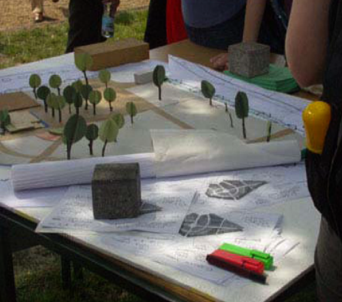ROMA-NeT to put Local Action Plans in place
Edited on
06 February 2015Several cities involved in a previous URBACT project to improve the integration of Roma populations are now working alongside URBACT to implement their carefully designed plans to support the inclusion of Roma.

The conviction that cities have a critical, central role to play in the social and economic inclusion of Roma populations was integral to this URBACT project.
Started in November 2009 by nine European cities - Budapest (HU) as lead partner, Glasgow (UK), Udine (IT), Almeira (ES), Bobigny(FR) Karvina(CZ), Bologna (IT), Torrent (ES) and Kosice (SK) – the ROMA-NeT thematic network enabled partners to share good practices and lessons learned, embedding them into their Local Action Plans, aiming to improve the cities’ local policy development and to deliver capabilities for stronger community cohesion between Roma and their neighbouring communities.
With 10-12 million members, the Roma population is Europe’s largest minority. Some of the challenges they face include communities that vary in terms of culture and religion, legal status, language, settlement models, and periods of migration.
Despite efforts at local, national and European levels, in many countries Roma show high levels of social exclusion from employment, education, health and social services, high rates of illiteracy and poor school attendance. Many Roma people live in segregated, isolated districts where overcrowding and a lack of basic facilities contribute to poor health.
Partner cities in ROMA-NeT, which closed in January 2013, worked for three years to investigate how to overcome negative attitudes and improve consultation and engagement with the Roma community.
Overarching aims
Together they identified ways to improve community cohesion and engagement, employment and education, social, healthcare and housing, as well as governance and community policing. Much of their work focused on a step-by-step inclusive approach, particularly for young Roma and their transition into active adult citizens.
The ROMA-Net project focused on three sub-themes: active community engagement/ empowerment; an integrated and area based approach to tackling exclusion and segregation; and building a transitional labour market.
“From the outset of ROMA-NeT, my aim was to increase, expand and extend the number of public officials at municipal authority level in Europe who better understand the complexities and interconnectedness of Roma exclusion issues, so they know that the only way is a step-by-step response, with the community at the centre,” said Ann Morton Hyde, lead expert on ROMA-NeT.
Collaborative exchanges through learning clusters
An opportunity for partners to discuss common problems, share difficult issues, introduce ideas and much more, six learning cluster events were organised during the project under the three overarching sub-themes. Over 220 people regularly participated.
“I increased my knowledge of situation in my city I had no understanding of,” said Tracy McDonald, Glasgow City Council (now Spire Housing Association).
According to Anne Morton Hyde, “the learning clusters provided the glue that held the project together, bonding the people and the local actions and moving the learning on.”

Eight thematic guides (for instance, ![]() Download Roma-Net Good practice guides The Education Challenges of Roma Inclusion Guidance (3.54 MB),
Download Roma-Net Good practice guides The Education Challenges of Roma Inclusion Guidance (3.54 MB), ![]() Download Roma-Net Good practice guides The Housing Challenges of Roma Inclusion Guidance (1.8 MB),
Download Roma-Net Good practice guides The Housing Challenges of Roma Inclusion Guidance (1.8 MB), ![]() Download Roma-Net Good practice guides The Employability Challenges of Roma Inclusion Guidance (1.84 MB)) are available - all containing case studies – which capture the experience and learning undertaken by the ROMA-NeT cities. They aim to share good practice across the EU.
Download Roma-Net Good practice guides The Employability Challenges of Roma Inclusion Guidance (1.84 MB)) are available - all containing case studies – which capture the experience and learning undertaken by the ROMA-NeT cities. They aim to share good practice across the EU.
Pilot project: the way forward
The ROMA-NeT thematic network closed in December 2013 but was then selected by URBACT for a new pilot phase. The project was selected, together with two other previous URBACT networks, to work on the implementation of their integrated Local Action Plans. This new phase will last for a 15-month period and should allow URBACT to understand the challenges of delivering the LAPs.
For Gizella Matyasi, the Lead Partner of Roma-NeT, a key expectation of the pilot programme “is the opportunity to advance in Roma-NeT and to find financial support to implement the Local Action Plans and Local Support Groups”. Integrated - instead of parallel – actions, and communications between other cities in the project, may give a better result, she added.
For this new phase partners will work together to rapidly identify themes and challenges, and then build a structure and common methodology to implement their own LAPs.
Familiar with each other and with working tools locked in place, the Roma-NeT network will collaborate by email, video conference and regular city meetings to share challenges and exchange good practice, to facilitate the rapid implementation of their LAPs. The pace is quick, the pilot programme comes to a close in early 2015.
Key messages from ROMA-NeT to other European cities
- Roma integration is not a project that only has one element; it is a process that should integrate a number of key elements.
- The integrated, community-led approach is the only way forward for social inclusion of Roma and other vulnerable groups.
- Involving Roma people from the beginning is key! If they seem disinterested, you are not trying hard enough!
- A step-by-step approach is needed. Initiatives forcing too big an "integration leap" are doomed to fail.
- The sinti in Italy do not want to live in camps anymore, we must work together with the communities to change and improve their living conditions.
- At this stage the operational experience of tackling Roma exclusion in cities is pretty limited, but the foundation and knowledge base is there to build good practice upon.
- We need a massive increase in action - a significant growth in new initiatives from many more cities in Europe.
- We can all play a part – bridges need to be built between Roma and non-Roma in our societies.
- Initiatives like Roma-net are very powerful in generating the conditions and will for positive change, but there is still a huge amount of work to be done.
Read more
- Roma-Net I project results - URBACT website
- Roma-Net I minisite - URBACT website
- ROMA-NeT II minisite - URBACT website
Submitted by admin on
